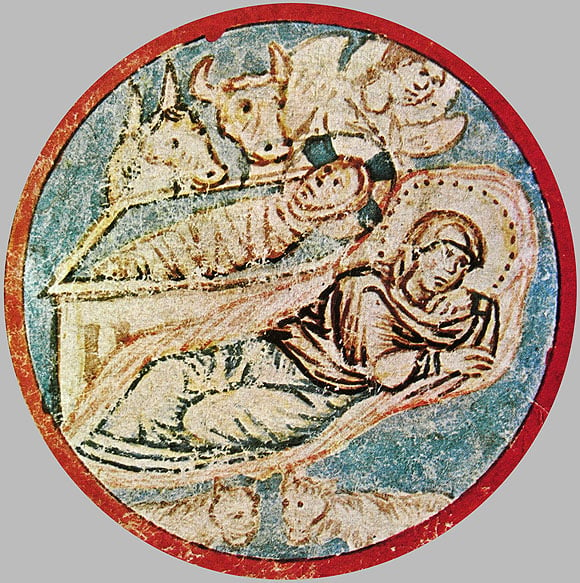The Nativity of Christ: Living Orthodox Christmas
23 December 2021Christmas is before us. How will we choose to celebrate it? And what, by the way, are we actually celebrating?
For Christians, Christmas is the Great Feast of the Nativity according to the flesh of Our Lord God and Savior Jesus Christ. With inspiring eloquence, St. John the Theologian writes: “In the beginning was the Word, and the Word was with God, and the Word was God” (Jn 1:1).
The Word Jesus Christ is the eternal Son of God and the door to the mystery of His Incarnation is opened by the Church’s beautiful hymnology. St. Joseph the Hymnographer chants: “The Son of the Father…has appeared to us…to give light to those in darkness and to gather the dispersed. Therefore, the far-famed Theotokos do we magnify.”

The Nativity of the Lord. Byzantine manuscript, 14th Century, Monastery of Cutlumus, Athos
From St. John of Damascus: “A most glorious mystery is accomplished today: nature is renewed, and God becomes Man. What He was, He has remained; and what He was not, He has taken on Himself without suffering commingling or division.”
Using Orthodox theology as a springboard, we can harness the celebration of Christmas to live a more fulfilling life — to live in the spirit (cf. Gal 5:25).
Let us begin with a central tenet which has been experienced by, and passed down from, the Church Fathers: that God became man in order that man may become god — through grace and adoption (cf. Eph 1:5). The Incarnation of Christ invites us to be holy; it is not only to be experienced by a small number of people, beyond the grasp of regular folk — it is for everyone, in every part of the planet.
Orthodoxy is not an ideology, a philosophy or a legalistic, rigid set of rules. Moreover, God is not an abstract idea, a faceless Person with Who we have no possibility of communication.
The Orthodox Faith preaches a personal God: Father, Son and Holy Spirit — Three Persons, One Kingship. God reveals Himself to us through the God-Man (Theanthropos, in Greek) Jesus Christ.
In a 1990 sermon delivered by the Abbot of the Holy Monastery of St. Gregorios of Mount Athos, the late blessed Archimandrite George echoes the Church Fathers: “The unapproachable God becomes approachable. The unknown God becomes known. The strange God becomes familiar and a friend.”
On Christmas, we celebrate the destruction of the barrier that separated man from God. And how do we know that this barrier has indeed been destroyed? Well, for one, through the Saints of the Church. The Saints show us that man can personally see and communicate with God.
“Saints,” according to the renowned 20th century theologian Fr. John Romanides, “is the name given to those who, through purification and illumination, reach glorification [theosis] and share in the glorifying energies of God.”
Thus, Orthodoxy is a positive science, the experience of revelation and not speculation. It is the experience of communicating with God through prayer, especially noetic prayer. It is the experiencing of communicating with God by doing His will, by fasting, giving alms, being humble and loving one another. It is the experiencing of communicating with God by living a Christ-centered life in the Church and by participating in the Holy Sacraments, especially confession/repentance and communion.
It is the experience of having true freedom, not the pseudo-freedom and trappings conferred by the world. Contrary to many critics, authentic Christianity does not restrict man but the opposite, it gives man his freedom to live. Itgives light to those in darkness.
This is a life-long challenge, a ladder to climb one step at a time. And how do we know if we are making progress, if we are in fact living in the spirit? Well, for one, if we cultivate the fruits of the Holy Spirit: love, joy, peace, patience, kindness, goodness, faithfulness, gentleness and self-control (cf. Gal 5:22-23).
This is all made possible because of Christmas. Let us choose to celebrate it correctly.






